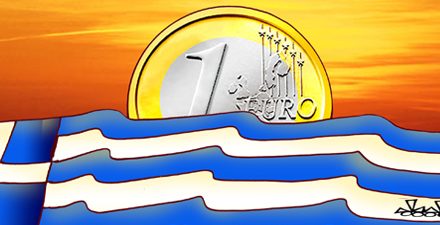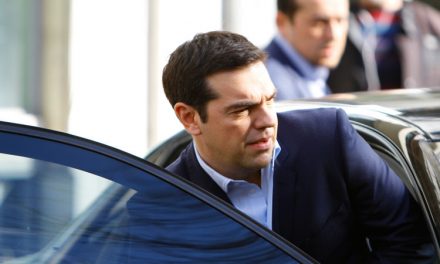By Mark Dragoumis
Panos Kazakos: “From the incomplete modernisation to the crisis” Reforms, debts and inertias in Greece (1993-2010)Πάνος Καζάκος: «Από τον ατελή εκσυγχρονισμό στην κρίση». Μεταρρυθμίσεις, χρέη και αδράνειες στην Ελλάδα (1993-2010)
Professor Kazakos attempts to explain in his latest of many books on the relationship between Greece and Europe how it is that Greeks wish their country to become more European while at the same time obstructing any real effort to make this happen. Premier Simitis (of PASOK) got elected promising “modernisation” in all fields and under “popular pressure” expressed in strikes and violent street demonstrations failed to implement his programme especially concerning the necessary changes in the country’s crumbling social security system.
Costas Karamanlis (New Democracy) promised the “re-founding of the state” and left the state on the verge of bankruptcy as huge, clientelistic and corrupt as ever. To his credit, George Papandreou (PASOK) who won the elections on 30 October 2009 did not make any grandiloquent promises. He simply said that “the money was there” for the suffering classes to be assisted, when it was not and he knew it was not.
It is obvious that any restriction on the competences of the state, any privatisation, curtails the possibilities of give and take in this game where rulers and their protégés have a good time at the taxpayer’s expense. Simitis who tried to change the system was accused of yielding to “liberal pressures” and of moving away from the “traditions of the Left”
To avoid impending bankruptcy George Papandreou agreed to be saved by a hefty loan from Brussels and the IMF with a number of strings attached. Under close supervision from the European Commission, the European Bank and the IMF Greece is indeed changing in more ways than one. Reforms that proved impossible in the past are slowly taking shape under the strict guidance of Greece’s foreign supervisors colloquially known in Athens as “troika”. With teams of foreign experts looking after the governance of the country, the split personality of the Greek voter seems to have been put under some kind of control, at least for the time being. Even those Greeks who were keen to be ruled by a Government biased in favour of special groups have, for now, had to bow to the inevitable.
What does emerge from Kazakos’ systematic study is that up till now when Greek voters saw themselves as citizens they were all for honesty, meritocracy and modernisation. However, once a government was elected they tended to revert immediately to their personal, familial and unionist priorities seeking favours, fighting for special treatment and even using corrupt practices. Truth is that this “return to basics” (really to personalised power instead of the rule of law as was the custom under the lawless Ottoman regime) had already become increasingly difficult even before the recent crisis with Greece being in the eurozone and exposed to the global economy. Kazakos points out a duality in the country’s institutions. On the one hand Greece has an independent central bank and guarantees the entrepreneurial freedom both for its own citizens and for the foreign would-be investors, while on the other hand it is “saddled with informal institutions and practices (illegal financial backing of political parties, give and take between MPs and their voters etc) something that leads eventually to ‘institutional disorder’… A political system that has relied for decades on clientelistic values and extra-institutional arrangements rejects basically any strict rules of the game and all innovative institutions”.
It is obvious that any restriction on the competences of the state, any privatisation, curtails the possibilities of give and take in this game where rulers and their protégés have a good time at the taxpayer’s expense. Simitis who tried to change the system was accused of yielding to “liberal pressures” and of moving away from the “traditions of the Left”. The fact that in 1996 Simitis saw himself on a par with reformist, market-friendly European socialists such as Tony Blair, Massimo d’ Alema, Lionel Jospin and others did not cut much ice with the “deep PASOK” forces that thrived on statist controlled favours increasingly funded by foreign loans. Simitis wrote in his book “The Crisis” (p.60) that “every reform is considered in Greece – erroneously of course – as being neoliberal”. No wonder he ended up ousted from the electoral lists of his party by his resentful colleagues.
Kazakos explains that the Greek governance model is not simply a politicians’ game. He describes quite vividly the many ways used by the Greek state bureaucracy to undermine any reform that interfered with its age-old practices. He explains in detail why this system is no longer manageable and he insists on the urgent need for Greece to be governed by laws, rules and regulations known to everybody and strictly adhered to, rather that by informal practices stemming from an obsolete “political culture” rooted in the Ottoman Empire. He deals extensively with the rent-seeking tradition of the Greek families and the groups they form for that purpose. He explains convincingly that unless competition is firmly established in the new model that Greece must adopt there is no long-term salvation for the Greeks. Borrowing for ever more and more to buy votes proved to be a recipe for disaster as the recent crisis has shown.
So the description of the illness as well as the diagnosis are well presented in this book and do help those who have not dwelled on the issue to understand it as fully as possible. Where he reveals his deep knowledge of the subject is at the last thirty pages where the book deals with the prognosis. The good professor asks himself: “What can we expect in the future? What will be the fate of various good intentions (and plans)? From what does it depend if –and what kind of – reforms will finally be implemented? How can the prejudices of public opinion against possible reforms ever change? The reforms that we are here talking about have a high political cost. So why should politicians decide to introduce them if we surmise that they are solely preoccupied with their re-election?”
a change of model is difficult in a time of crisis but his whole book is a vivid illustration of the fact that in “easier times” it has been impossible for Greek governments to change the system and survive. So today, radical change may be difficult but avoiding to implement it leads to bankruptcy. So, in a perverse way, there is hope
Kazakos keeps an open mind. He examines two opposing theories as to the impact of the crisis on reforms. One says that it makes them easier to introduce and become accepted as a new political culture evolves under the pressure of a possible bankruptcy. The opposite view holds that the crisis makes reforms more difficult because the government has no money to compensate those who will be hit specifically hard by them. The truth is that there is evidence supporting both theories. Kazakos insists that a decision must not be made according to such empirical findings but on whether the crisis is really perceived as such or not. He is not sure whether this is really the case in Greece but he notes that there is no movement to take Greece out of the euro and back to a devalued drachma and a regime of “absolute national sovereignty” that would allow traditional politicians to continue playing their games as before.
The result of this clear preference of the Greeks to stay within the eurozone, come what may, has made the role of the “troika” more or less acceptable by all political parties except those on the Left. This choice implies the existence of a government that will stay on for a full four-year period to implement the difficult policies ahead. As Kazakos puts it (p.241). “In effect a government whose mandate is deemed to be short, which has a marginal majority in Parliament and finds itself confronted at every step by a relentless opposition yielding on nothing and asking for elections will indeed avoid taking hard decisions”. So the outcome in Greece is far from certain. Professor Kazakos hopes that the government of George Papandreou will be able to both overcome the crisis with the help of the “troika” and reshape the Greek economy by replacing the obsolete, statist, corrupt model with a new one that will allow the country to make full use of its advantages (shipping, tourism, green growth).. He accepts that a change of model is difficult in a time of crisis but his whole book is a vivid illustration of the fact that in “easier times” it has been impossible for Greek governments to change the system and survive. So today, radical change may be difficult but avoiding to implement it leads to bankruptcy. So, in a perverse way, there is hope.
The difference of approach between Greece and its European partners is shown when Kazakos quotes Stephanos Manos – the Greek politician that has for decades been the most articulate and consistent promoter of the necessary reforms – comparing Greece’s Constitution to the Lisbon Treaty, in an interview to the newspaper “Apogeymatini” on 18-1-206, In the Lisbon Treaty, Mr Manos points out “there are 37 mentions of the concept of competition and competitiveness. In our Constitution, on the contrary, the concept of competition is absent. In Europe, the economy is based on competition. In Greece the economy is based on the state”.



















